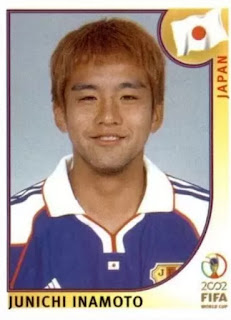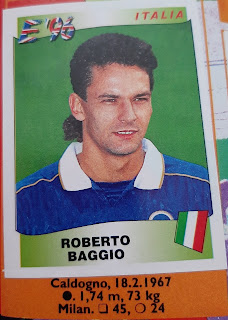542: Junichi Inamoto, Japan, Panini 2002 FIFA World Cup Korea/Japan Official Sticker Album
Mat Jolin-Beech is back with some more insight from his recent travels. Today’s subject played at three World Cups and earned 82 caps as his nation consistently impressed on the international stage. He proves that age is but a number by still playing to this day but quite frankly we know you’re really here to find out about Mat’s holiday so let’s not delay him any further.
Japan is an amazing country. Clean, modern, futuristic and yet firmly with one foot in its past. It is unique. If you’ve not yet read by post on Park Ji-Sung, you may have missed the fact that I’ve recently been on holiday to South Korea and Japan.
Both are amazing places, but they are surprisingly different. In Tokyo, there are no street markets and food stalls on the streets, but you will find people in Pikachu onesies chasing Bowser around the streets in real life Mario Karts. You will find five floor arcades packed with people watching hardcore Dance Dance Revolution veterans battling it out, and a multitude of random, never-seen in the West music and rhythm games. There is also a Poo Museum. I’ll just leave that one there, and let your imagination run riot. You do get to leave with a poo on a stick though. So, winning.
However, I should try to bring this vaguely football related blog back to football, and not poo, Pokemon and perfect dancing performances. Much as the Park Ji-Sung post touched on, I was also thinking about Japanese football. To us Westerners, there are more names we can pluck out, but again it is not an extensive list. Off the top of my head, I had a few names. Shinji Kagawa, Brighton and Hove Albion’s Kaoru Mitoma, and one Junichi Inamoto were the players that emerged from the jetlagged grey matter.
He was the Gunners’ first Japanese player, although he did not have a great, nor long, career in North London. A handful of appearances, none in the league, followed before another long-term loan to a London club – this time Fulham. He fared much better here, with dozens of games, some spectacular goals and cult status. He also earned the nickname Japanese Peach from commentator Barry Davies. A broken leg, ironically in a friendly against England (is that really irony though?) curtailed his loan at Fulham and he retuned to parent club Gamba Osaka. [Osaka is also a great city to visit by the way!]
A decidedly cheap move to West Bromwich Albion followed, only £200,000 for a player Japanese media described as bigger than Beckham. No small claim in the early 2000s. Moves then came to Cardiff City on loan, Galatasaray, Eintracht Frankfurt, Rennes and then moves back to Japan.
What I did find amazing is that Inamoto, at the age of 43, is still playing professional football. He is currently at Nankatsu SC. This is a fifth ties Japanese football club, although they do hold the J. League 100 Year Plan Status. This basically means they have signed up and stated their intention to become a professional club and to join the J. League pyramid that governs the top three levels of the Japanese football. So he is still doing what he enjoys, and is helping to establish a growing club. Not too dissimilar to what park is doing in Korea – albeit in a different way. The club is based in the Katsushika ward in Tokyo, which I visited when I was in the city.
I didn’t visit the club, but I did go to a really good 7 Eleven there. Have I mentioned I’ve been on holiday recently?





Comments
Post a Comment